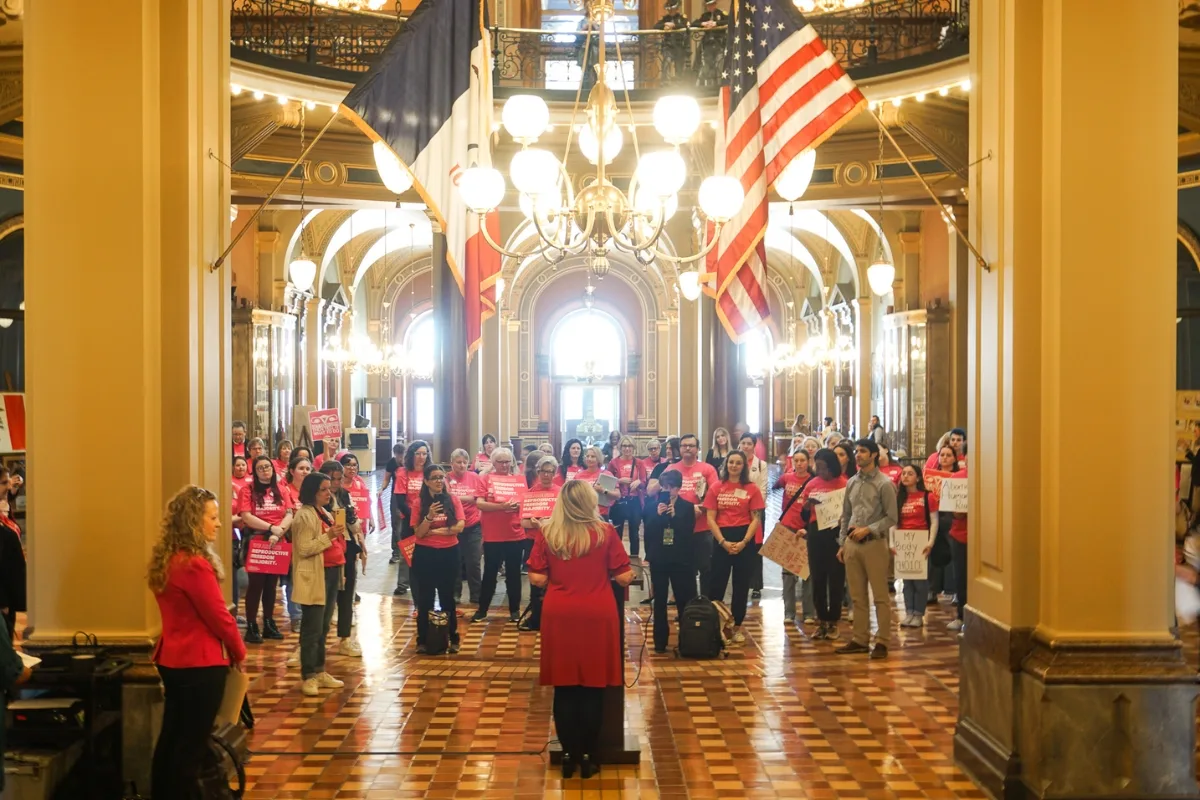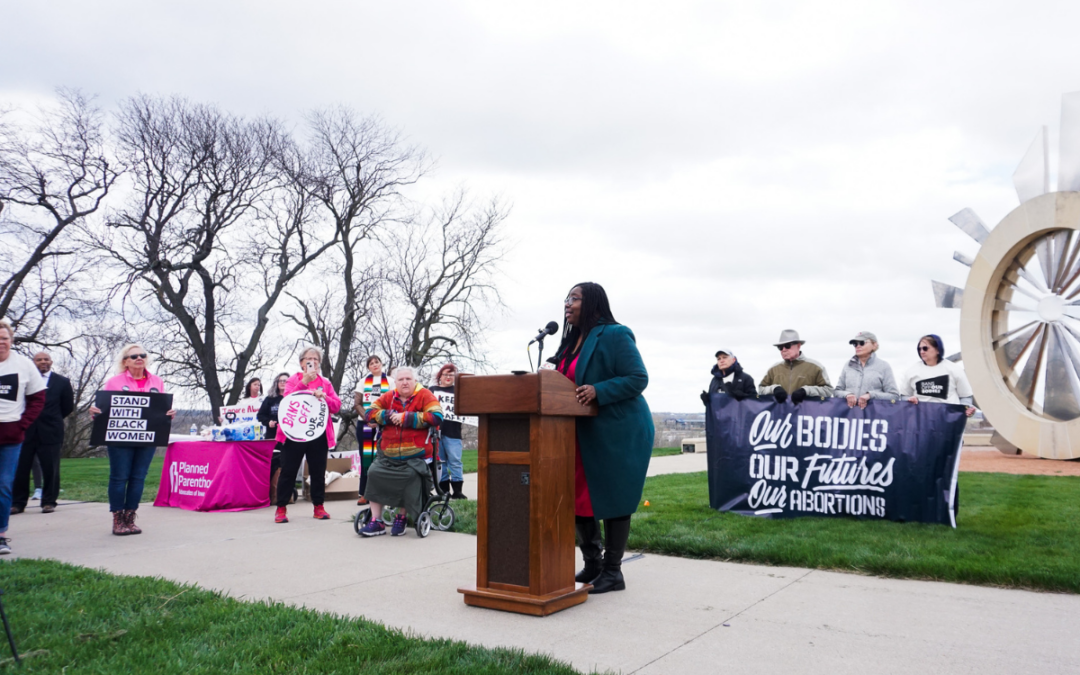
House Minority Leader Jennifer Konfrst speaks at a reproductive rights rally in the Iowa Capitol on Feb. 29. Photo by Avery Staker, Starting Line staff
Two bills affecting Iowans’ reproductive health passed out of the Iowa House Wednesday afternoon and could soon become law.
Postpartum Medicaid
SF 2251 passed the House 70-25, and it would restrict the number of people who qualify for postpartum Medicaid coverage in order to expand coverage to a full year.
A fiscal note attached to the bill notes: “The [Iowa Department of Health and Human Services] reports that approximately 15.8%, or 1,700 members per month on average, would be ineligible for Medicaid coverage in future years under the provisions of the Bill.”
That number breaks down to 1,300 mothers and 400 infants of the current 10,800 Medicaid members with postpartum coverage.
Gov. Kim Reynolds, a Republican whose term ends in 2026, named expanded postpartum Medicaid coverage one of her legislative priorities. Iowa’s eligibility period is currently 60 days post-birth (about two months).
To expand the coverage, Republicans restricted the income eligibility from 375% of the federal poverty line to 215%. For infants, family income limits were reduced from 375% to 302%.
An income of 375% for a family of four is $112,500 per year, according to 2023 poverty guidelines from the US Department of Health and Human Services. An income of 215% is $64,500 per year. An income of 302% is $90,600.
Maternal care advocates have said family income is a poor measure for deciding who should qualify for health care coverage. Especially given Iowa’s high rate of workers without employer-based health care.
“In general, Medicaid is the payor of last resort,” said MaryNelle Trefz, advocacy network director for Iowa ACES 360. “So if you have access to employer-based health insurance coverage, you are not going to qualify for Medicaid.”
Some of the most deadly pregnancy-related conditions happen outside of the 60-day limit, and postpartum care includes everything needed to recover from childbirth. It also covers health problems that can arise from pregnancy and childbirth including heart conditions, diabetes, seizures, and mental health issues, among others.
The fiscal note states “A monthly average of approximately 1,100 infants…may have coverage shifted from Medicaid to Hawki if they are not covered by other insurance.”
It also notes “An estimated 2,700 women…who otherwise would have lost Medicaid coverage after 60 days may be eligible for Medicaid coverage.”
As for the touted savings, the note states, “Senate File 2251 is estimated to increase State costs by approximately $1.1 million in (fiscal year) 2025, $3.3 million in (fiscal year) 2026, and $388,000 in (fiscal year) 2027.”
The Iowa Senate passed the bill in February and if Reynolds signs it, the new coverage limits go into effect in January 2025.
MOMS Program
The other bill, SF 2252, concerns Iowa’s More Options for Maternal Support (MOMS) program which directs state tax dollars to fund “pregnancy support services” that explicitly discourage pregnant people from getting abortions.
These services are commonly anti-abortion centers, with religious ties and reputations of lying to and threatening pregnant people who come to them for help, to prevent them from getting abortions. Most aren’t staffed by medical professionals.
In the bill, these centers are defined as: “those nonmedical services that promote child birth by providing information, counseling, and support services that assist pregnant women or women who believe they may be pregnant to choose child birth and to make informed decisions regarding the choice of adoption or parenting with respect to their children.”
For years, the MOMS program has struggled to find and hire an administrator (manager), and this bill, which passed 61-34 in the Iowa House, aims to fix that by lowering the criteria.
The bill would allow the Iowa Department of Health and Human Services to administer the program directly. If the department opts to search for a manager, there are no requirements for experience managing a similar type of program. Previously the requirement was at least three years.
Iowa Republicans have set aside $2 million for the MOMS program so far and this year, four centers were chosen for state grants through the program.
The legislation passed the Senate 31-16 in February, so the bill will now go to Reynolds for her signature. It goes into effect immediately.
Politics

Biden marks Earth Day by announcing $7 billion in solar grants
The Biden administration on Monday announced the recipients of its Solar For All Program, a $7 billion climate program that aims to lower energy...

6 terrifying things that could happen if the Comstock Act is used to target abortion
Does 1873 sound like a really, really long time ago? Well, that’s because it is—but if Republicans and far-right anti-abortion activists have their...
Local News

No more Kum & Go? New owner Maverik of Utah retiring famous brand
Will Kum & Go have come and gone by next year? One new report claims that's the plan by the store's new owners. The Iowa-based convenience store...

Here’s a recap of the biggest headlines Iowa celebs made In 2023
For these famous Iowans, 2023 was a year of controversy, career highlights, and full-circle moments. Here’s how 2023 went for the following Iowans:...





